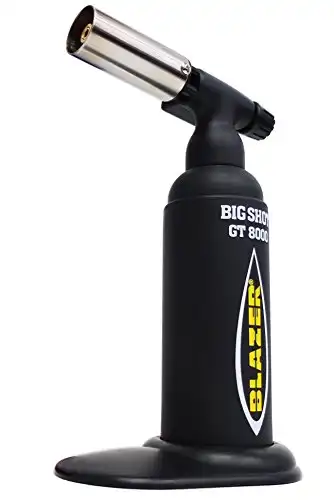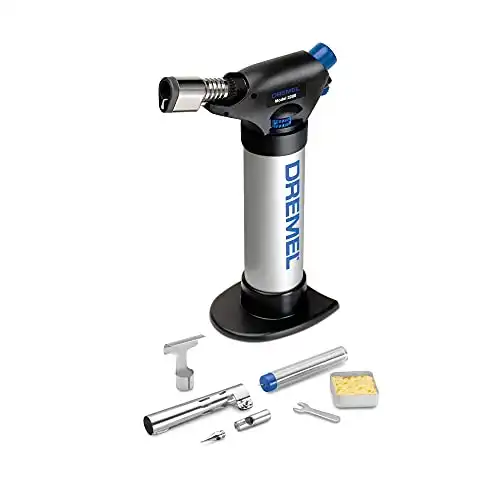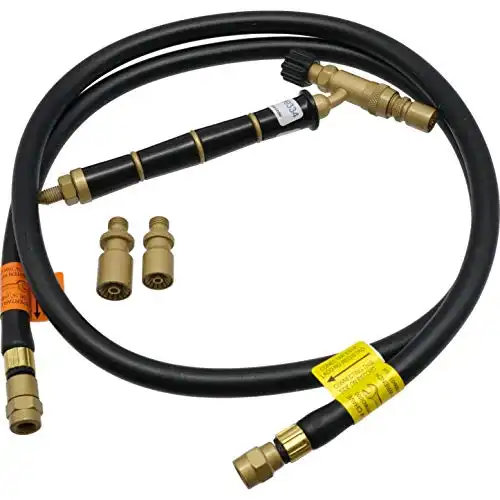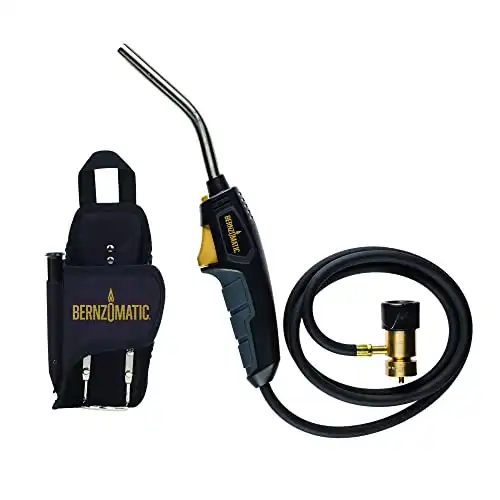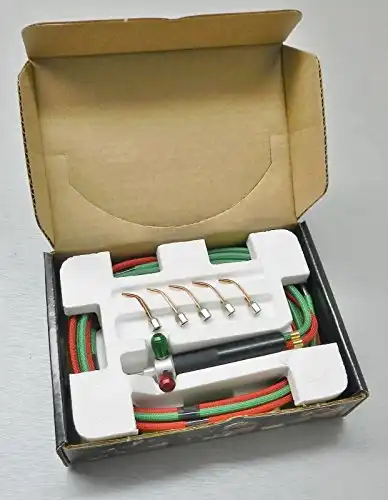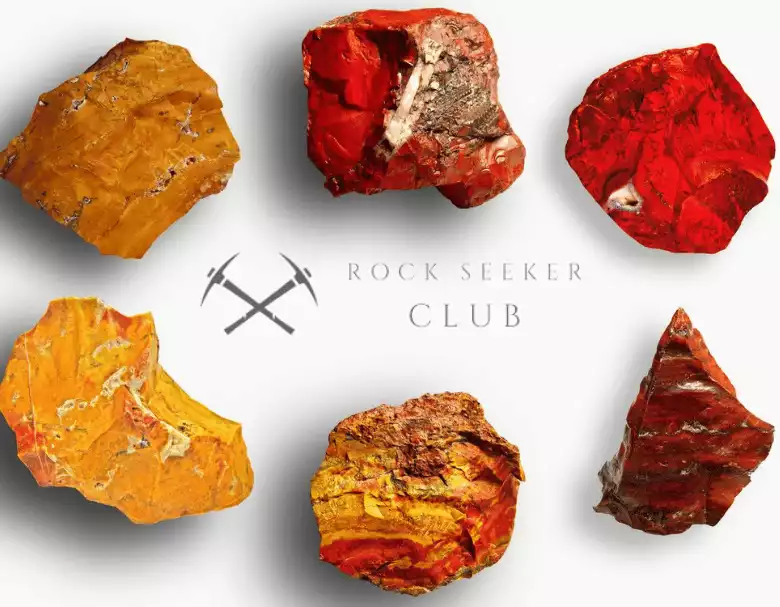Among the most important tools on your workbench are your torches. For a newbie, however, the whole process can be confusing and it’s hard to figure out exactly what you’ll need in the end. I’m here to help you make sure that you get the right torch for your studio needs.
So, let’s dive into the subject and I’ll help guide you to the right choice!
1. Blazer GT8000 Big Shot – Best Beginner Silversmithing Torch
Hands down the most recommended butane torch is the Blazer Big Shot Series. The GT8000 is top of the line for a butane torch, producing a powerful and consistent flame at the touch of a button. It’s the torch most people will recommend for a beginner, and I can get behind that.
This is a butane-powered refillable torch. You just need to gas it up with butane and you’ll be good to go. It will lock on and has a stable base in case you need your hands while heating something and it produces a surprising amount of heat for its fuel source.
It’s well-engineered, but you will have to pay for that engineering. That’s the biggest downside, it’s just rather pricey for a butane torch. It’s also got some problems staying on when you switch to the smallest flame settings.
But, minimal complaints aside, this is a great torch for new smiths. It’s more than capable of most beginning work and can even handle smaller melts.
Things I Like
- Powerful flame
- The adjustable knob is easy to use
- Locks on for hands-free use
- Well-engineered and great build-quality
Things I Don’t Like
- High priced
- Has trouble on low flame settings
2. Dremel 2200-01 Versa Flame – Runner Up
This is my light-duty torch in my own studio, and it’s held up well for the two years it’s been in daily use. The 2200-01 is a solid, mid-sized butane torch with great build quality overall. Mine’s been dropped a dozen times and only taken some light, cosmetic damage.
The flame functions through the whole range, from a tiny little prick to a few inches of strong, blue flame. It’s easy to operate with one hand, including the lock, and doesn’t suffer much when you have it on for extended periods. It’s a solid torch that does exactly what it’s supposed to.
That said, there are a couple of things I’m not big on. The flame is relatively weak, requiring a lot of forethought to melt more than 8-10 grams of silver and requiring a fine touch for soldering larger pieces. And, frankly, the attachments that come with it are pretty much useless. The big tube for a larger flame would be nice, but it rattles and doesn’t hold on well.
Overall, this is a solid choice for beginners. Just be aware it has more limitations than the Big Shot when it comes to heat capacity, but it’s perfect for doing fine work at home.
Things I Like
- Great build quality
- Produces a lot of heat for its size
- Easy one-handed operation
- Great for light, pin-point work
Things I Don’t Like
- Not as powerful as the Big Shot
- Attachments aren’t up to par with the torch itself
3. ORCA Hand Torch – Best Propane/MAPP Torch for Beginners
The ORCA is a great hand-torch for home use, and probably the most powerful torch I’d recommend for a beginner. It’s powerful, lightweight, and easy to use. It also comes with a few different heads to allow you to get the flame you need.
It’s a great piece and one that most smiths will appreciate. The extra power is great for melting down silver to work it further, and it works well for soldering with the right tip. Overall it’s a beast, but one that can be tamed to handle delicate work as well.
The main complaint is that the torch head sometimes fills with wax. It’s best to completely disconnect the hose after using the torch to avoid problems with additives building up but it’ll clean easily in most solvents. It’s also important to get the right adapter for what you’re doing, since the kits don’t cover you for every type of tank.
The ORCA is one of the most recommended propane torches around, and it’s easy to see why when you’re working with one. That said, it takes a bit of extra maintenance and know-how compared to butane torches.
Things I Like
- Very powerful for a propane torch
- Easy to use
- Can handle medium-sized melts
- 3 tips let you choose the right flame for your needs
Things I Don’t Like
- A bit expensive
- Needs a bit of extra maintenance to avoid clogging
4. Bernzomatic BZ8250HT – Budget Melting Choice
Bernzomatic makes some excellent torches, but you need one with the hose for jewelry work. The others tend to not like inversion and are made to braze pipes while standing up, but this little beauty has a good-sized hose that plugs right into a propane tank.
It’s well-made, does what it says on the box, and has the capabilities you need. It’s also about half the cost of most of the propane torches you’ll see recommended. The brand speaks for itself, however, and this isn’t like buying a knock-off to avoid spending more.
It’s a bit limited for some use. It only has one head and a simple on-off switch, making it foolproof but not really versatile. It’s still usable for silversmithing, you’ll just need to be careful about the heat’s spread with no option to tighten the flame. I also don’t trust the piezo lighting mechanism for longevity, but mine is still going strong after over a year.
This is a great torch for a beginning smith who wants some extra oomph. You’ll save some money but get a safe product, and it’s a good backup “melting torch” for those who mainly work with butane.
Things I Like
- Powerful flame
- Very easy to use
- Great build quality
- Good brand support if anything is wrong
Things I Don’t Like
- Only one flame setting
- The piezo mechanism may lack durability over the long term
5. Smith Little Torch – The Jeweler’s Gold Standard
If you’ve been around jeweler’s circles for a while, you’ve seen the Smith Little recommended. It’s what I’d suggest you pick up if you need an oxy-acetylene setup for your home workshop, but I feel it’s overkill for most newbies despite its small size.
The torch is top-notch. It comes with five different heads, there are more specialized heads available from the manufacturer, and it puts out a lot of heat. Its exactly what you’d expect from a professional quality torch.
That includes the cost. Do not buy any of the knock-offs of this torch to save money. I cannot emphasize that enough. It’s also, by far, the least user-friendly torch out of the ones on this list. Make sure you study up before you decide to bring it home.
That said, no list of silversmithing torches is complete without a look at the Smith Little. It’s powerful, versatile, and intended for fine, high-heat usage. Just make sure you get the real thing and make sure an oxy/acetylene rig isn’t going to nullify your insurance before making the investment.
Things I Like
- Jeweler’s gold standard of torches
- Comes with several heads
- Great size for jewelry work
- More accessories are available to get even more specialized
Things I Don’t Like
- Much harder to use than propane or butane torches
- Very expensive for a small shop’s budget
How to Choose a Torch for Silversmithing
There are a few factors you have to take into account when picking a torch, even before we get into the issue of quality. You’ll need to take all of the following into account when choosing.
Torch Type
The type of torch is the first decision you have to make. You’ve got a few choices right from the start:
- Butane- The lightest torches available that will work for silversmithing. Butane torches tend to be small, weak, and often looked over by experienced smiths. They do have some big advantages we’ll discuss in a moment.
- Propane/MAPP- Hotter and bigger, these torches are often used for melting silver for casting ingots. They can also be used to solder, although MAPP gas can be a bit hot for newbies.
- Oxy/Acetylene Torch- The professional’s torch of choice. These powerful torches can have varying heads ranging from a big burner to pinprick flame, but they require more care than the others.
You’ll also run into propane/oxygen setups, which is another powerful option to keep open to you.
Butane torches get a bad rap, in my opinion, and it’s mostly from those who’ve upgraded at some point. It’s hard to compare them to even something as simple as a Benzomatic propane hose, because they have a smaller, cooler flame than the majority of torches.
That said, with enough time you can melt silver and do a lot of soldering with a butane torch. Learning heat control with one is much easier than with most torches, and if you get creative you can do a lot with one.
There’s one other advantage here: there’s never going to be a clause in insurance or a lease that prevents you from having a little butane torch. They’re about as much risk as the gas burners on your stove for the most part.
My recommendation to a new silversmith is to start with butane unless you have professional instruction. You really don’t have to mess with them, just figure out where the lock-out is and get at it. The fuel is safe to store, found at most corner stores, and they’re generally not a lot of hassle.
They are weaker than any other type of torch. For melting and soldering large pieces you may need to get creative with your environment. Large fire bricks are awesome, and easily cut down to retain heat for specific purposes.
Propane and MAPP gas torches run hotter, allowing you to solder larger pieces and meltdown sizable amounts of silver. The restrictions on the gasses are a bit lighter than oxygen-fed torches as well, and propane is available all over the place. MAPP gas is a bit hotter, more expensive, and cross-compatible with most propane torches.
Finally, we have oxygen/acetylene torches. These are the gold standard, and the Little Smith torch I linked to above is pretty much the jeweler’s torch.
They’re also more dangerous, harder to work with, and usually aren’t covered by insurance. Indeed, having an oxy/acetylene tank set in your home can invalidate most home insurance. Your options are to keep the tank outside or to just use another type of torch.
Propane/oxygen torches are also available but require a different regulator and the oxygen bottle is still problematic for insurance purposes.
I think oxygen-fed torches are a bit overkill for most home setups, but you’ll want to look into them if you’re planning on doing large work at home. Many newbies want to try their hand at heavier cuffs, for instance, which are pretty much impossible with a butane torch and pushing it with regular propane.
No Knock-Offs
If you’re buying an oxygen-enriched torch, such as an oxy/acetylene, you need to go for a trusted brand. Don’t play around with cheaper knock-offs, especially if you don’t know much about torches.
I know of three incidents where people have had disasters happen in the last couple of years, all of them were caused by defective manufacturing of oxygen/acetylene torches. Specifically cheaper knock-offs of the Little Smith torch.
Most people who know what they’re doing and still take the risk will end up spending just as much money replacing dangerous parts as buying the right torch in the first place.
Just don’t go there. Buy something without oxygen enrichment if you’re trying to save money.
A knock-off rolling mill requires a ton of adjustment, a knock-off disc cutter punches rough discs, a knock-off miter jig may be stiff and hard to use… but a knock-off torch can cause an incendiary failure that takes out your house.
That’s not an exaggeration. That’s a possibility if you’re using an unsafe setup.
Butane torches and propane/MAPP-only torches usually just have durability issues when you buy knock-offs, but anything that’s tank-fed can become a serious risk. And if you’re not well acquainted with torches already then you don’t even know how to tell which parts can cause issues.
Just sidestep the issue by buying a trusted brand.
Capabilities
What you’re planning to do is the biggest factor in your torch.
For the most part, I recommend butane for home use. Propane if you want to step up to something stronger for larger melts or soldering larger pieces. Oxygen-enriched torches are a hassle and require a lot of know-how to operate.
You can certainly get that know-how easily enough, but unless you need that much torch you’re just messing with your insurance policy and possibly taking an unnecessary risk.
On the other hand, you can also use a butane torch for some pretty impressive stuff if you have an extra couple of hard fire bricks around. Cut them up and you can use them for heat retention, allowing you to melt a good amount of silver and solder relatively large pieces.
If you’re planning to do large work from the outset, a propane torch may be the way to go. You can use the same tricks to up the heat with these torches.
Oxygen-acetylene torches are the gold standard for professionals, but most of us are working at home and there’s not much reason for it. That said, if you have a dedicated workshop and are willing to build a safe enclosure for the tanks they’re a solid choice.
But in the end, a basic butane torch is cheap, easy, and safe compared to most options. You can always upgrade later, especially since the cost of a good butane torch is negligible when compared to something like the Little Smith.
- Online rock and mineral club for collectors of all levels!
- Find community with like-minded rock and mineral enthusiasts.
- Monthly Giveaways!
- Free Access to Entire Digital Library of Products (annual memberships)

